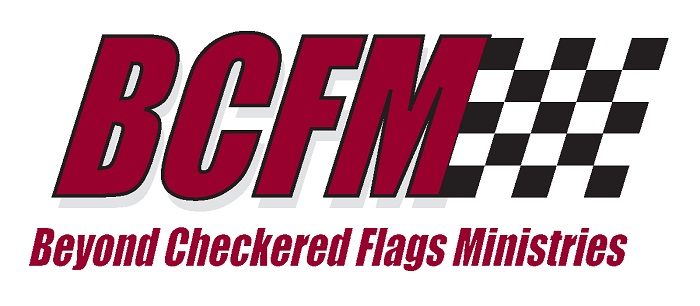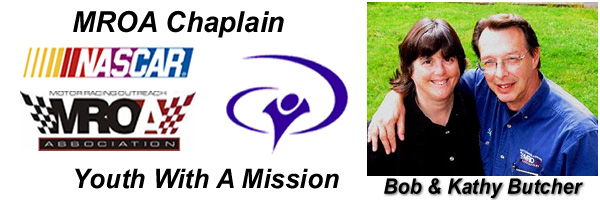
Chapel Service
Montana Raceway Park
August 7, 2010 – Part 1
“Mechanics of Forgiving”
Bob Butcher
Part 2:
Colorado National Speedway on August 14, 2010
Part 3:
Miller Motorsports Park September 12, 2010
Forgiveness is bolted together by the rules God sets forth in His rulebook.
As Christians we should be the most forgiving people in the world, however, as we all experience it is often difficult to do it genuinely and completely.
Without that we are not biblical when compared to what God says in Colossians 3:13: “Bear with each other and forgive whatever grievances you may have against each other. Forgive like God forgave you!”
Think of that statement …or really …command …in light of the prayer you have prayed many times: “Forgive us our trespasses as we forgive those who trespass against us.” Matthew 6:12. Or, try living up to Ephesians 4:32: “Be kind & compassionate to one another, forgiving each other, just as Christ forgave you.”
What would happen if God forgave you & me in exactly the same way as we forgive others all too often? …”I forgive you …but …we can’t be close …or …paybacks are a bear …or …I won’t forget that… etc.”
Truth is: …You CANNOT do it alone, PERIOD. You can try to stuff your feelings deep inside, try not to think about it, put on a false smile when you see them, or whatever your way of dealing with the hurt, betrayed trust, or anger that you feel, happens to be.
Unless you heart is changed by God, the memories and feelings will be lurking in the background, poisoning your thoughts and words, and preventing you from rebuilding the trust and relationship between you.
Forgiveness is a decision …BUT… we first must see what it is NOT:
- It is not a feeling …it is an act of the WILL
- Forgiveness involves a series of decisions …the 1st being to call upon God to change our hearts.
- Forgiveness is not forgetting …it is an active process.
- Forgetting is a passive process …the act fading from memory with passing time.
- Forgiving demands an active process …a conscious choice and deliberate course of action.
- We must call on God’s GRACE to consciously decide NOT to think or talk about what has been done to us.
- It requires a LOT of EFFORT …especially when an offense is fresh in mind. …Fortunately, when we DECIDE to forgive & STOP dwelling on the offense, painful memories usually begin to fade.
- Forgiveness is NOT excusing. …Excusing says “That’s okay” and implies “What you did wasn’t really wrong” …or …” you couldn’t help it.”
- Instead, Forgiveness is the OPPOSITE of excusing!
- Forgiveness says: “We BOTH know what you did was wrong & without excuse, …BUT, since God has forgiven me, I forgive you.”
- Because forgiveness deals HONESTLY with sin, it brings a freedom that no amount of excusing could provide.
- Instead, Forgiveness is the OPPOSITE of excusing!
The frequent failure in forgiving is keeping a mental record of the wrongs done & bringing them up again and again; or talks about them to others.
- To often out here, it also includes paybacks …& upping the ante.
- Either one destroys relationships & deprives them of the peace and freedom that comes from genuine forgiveness.
To forgive somebody means to release them from liability to suffer punishment or penalty, …making this a COSTLY activity.
- Forgiveness is undeserved & cannot be earned (Luke 7: 40-43)
- When someone sins, they create a debt, and someone MUST pay.
- Most of this debt is owed to God. – In His great mercy He sent His Son to pay that debt on the cross for all who trust in Him.
- Part of the sin is owed to you & means YOU have a choice.
- You can either take payments on the debt or make payments.
- By withholding forgiveness, dwelling on the wrong, gossiping, lashing back, seeking revenge, etc.
- These ALL extract a high price on YOU in the long run:
- “Unforgiveness is the poison we drink, hoping the other person or persons will die.”
As I said, the price is high. You may need to bear certain effects of the other persons’ sin over a long period of time.
- This may involve you fighting with painful memories
- Speaking gracious words when you don’t want too.
- Working to tear down walls & be vulnerable with little trust
- Enduring consequences of physical/material injury the other person is unable or willing to repair.
As I said; forgiveness can be extremely costly, but if you believe in Jesus you have more than enough to make these payments. He established an “account of abundant grace” in YOUR name to draw from.
- As you draw on that grace through faith day by day, you find you will have all you need to make the payments of forgiveness.
Therefore, forgiveness is a decision to make four (4) promises:
- “I will not dwell on this incident”
- “I will not bring up this incident again & use it against you”
- “I will not talk to others about this incident”
- “I will not let this incident stand between our personal relationship
Remember as we go to part 2:
“Vengeance is Mine, I will repay.” The Lord will judge His people.” (Hebrews 10:30)
Still to be discussed:
- The timing of when you should forgive.
- What about repentance & consequences?
- Can you ever mention the sin again?
- Assessing your contribution to the problem.
- Recognizing sinful attitudes & expectations.
- Recognizing that God is working for good.
Bibliography / References / Helps:
First & Foremost: The Bible
Versions:
New King James
New American Standard
The Message
YWAM (Youth With A Mission)
MRO (Motor Racing Outreach)
Church On The Hill, Salem OR
Life Church, Salem OR
Books:
The Peacemaker
A Biblical Guide to Resolving Personal Conflict
Ken Sande
Publisher: Baker Books

